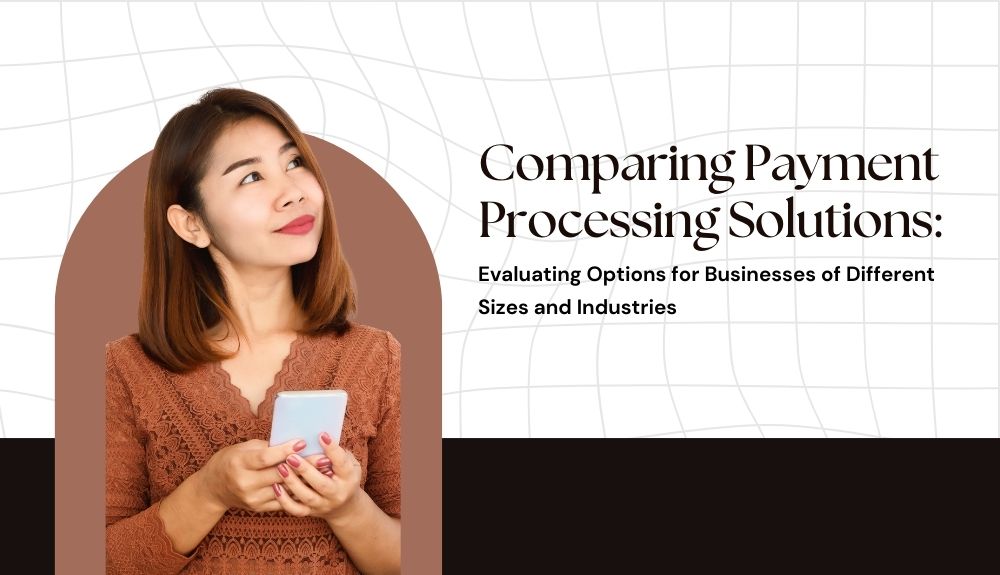
By max February 22, 2024
Introduction to Payment Processing Solutions
Welcome to the world of payment processing solutions, where businesses of all shapes and sizes can find the perfect fit for their financial transactions. Choosing the right payment processing solution is crucial for ensuring smooth operations and customer satisfaction. Whether you’re a small startup or a large enterprise, there are options tailored to meet your specific needs. Join us as we explore the best payment processing solutions for businesses of different sizes and industries, helping you make an informed decision that will benefit your bottom line.
Factors to Consider When Choosing a Payment Processing Solution
When choosing a payment processing solution for your business, there are several factors to consider. First and foremost, you need to think about the fees associated with each option. Look at transaction fees, monthly charges, and any additional costs that may apply. It’s important to find a solution that fits within your budget while still offering the features you need.
Security is another crucial aspect to keep in mind. Make sure the payment processor complies with industry standards for data protection and encryption. You want your customers’ information to be safe and secure during transactions.
Consider the types of payments accepted by the processor as well. Whether it’s credit cards, mobile payments, or e-wallets, ensure that your chosen solution supports the methods preferred by your customers.
Integration capabilities are also essential. Choose a payment processing solution that seamlessly integrates with your existing systems and software for smooth operations.
Think about customer support – opt for a provider with reliable customer service in case any issues arise down the line.
Best Payment Processing Solutions for Small Businesses

For small businesses, finding the right payment processing solution is crucial to streamline transactions and enhance customer satisfaction. One of the best options for small businesses is Square. With its user-friendly interface and affordable pricing, Square allows businesses to accept various payment methods seamlessly.
Another top choice for small businesses is PayPal. Known for its reliability and widespread popularity, PayPal offers secure transactions and easy integration with e-commerce platforms. This makes it a convenient option for online stores or service-based businesses.
Stripe is also a preferred payment processing solution for small businesses due to its flexibility and customizable features. Small business owners can easily set up recurring payments or subscriptions using Stripe’s intuitive dashboard.
Shopify Payments caters specifically to e-commerce businesses, providing a seamless checkout experience and integrated inventory management tools. By choosing the right payment processing solution tailored to their needs, small businesses can boost efficiency and drive growth in today’s competitive market.
Ideal Payment Processing Options for Medium-Sized Businesses
For medium-sized businesses looking for the ideal payment processing options, it’s crucial to find a solution that strikes the right balance between functionality and affordability. These businesses often require more advanced features than small enterprises but may not need the scale of services provided to larger corporations.
One excellent option for medium-sized businesses is a comprehensive payment gateway that offers a range of payment methods, fraud protection tools, and customizable reporting features. This allows them to cater to their customers’ diverse preferences while ensuring secure transactions.
Another important consideration is scalability. As these businesses grow, they need a payment processing solution that can easily adapt to increased transaction volumes without compromising on speed or security.
Additionally, having access to dedicated customer support is vital for medium-sized businesses. A reliable provider should offer responsive assistance in case of any issues or technical difficulties that may arise during transactions.
Finding the ideal payment processing options for medium-sized businesses involves striking a delicate balance between functionality, scalability, and customer support. By choosing a solution that meets these criteria, medium-sized companies can streamline their operations and provide seamless payment experiences for their clients.
Top Choices for Large Corporations and Enterprises
For large corporations and enterprises, having a robust payment processing solution is crucial. These businesses deal with high transaction volumes and require advanced features to meet their complex needs.
One top choice for large corporations is a customizable enterprise-grade payment platform. This type of solution offers scalability, advanced security measures, and integration capabilities with existing systems.
Another popular option for big companies is a global payment gateway that allows them to accept payments in multiple currencies and regions seamlessly. This helps streamline international transactions and expand their customer base worldwide.
Large corporations also often opt for dedicated account management services provided by payment processors. This personalized support ensures prompt resolution of any issues or inquiries that may arise during payment processing operations.
In addition, many enterprises prefer solutions that offer detailed reporting and analytics tools to gain insights into their financial performance and customer behavior trends. Such data-driven decision-making can help optimize business strategies effectively.
Specialized Solutions for Different Industries

When it comes to payment processing solutions, one size does not fit all. Different industries have unique needs and requirements when it comes to handling transactions. For example, a retail business may benefit from point-of-sale systems that can handle high volumes of small transactions quickly and efficiently.
On the other hand, an e-commerce business may prioritize online payment gateways that offer secure and seamless checkout experiences for customers. Industries like healthcare or legal services often require specialized compliance features to ensure sensitive data is handled securely.
Hospitality businesses such as restaurants or hotels might look for integrated solutions that can manage both reservations and payments in one system. Educational institutions may need payment processing options tailored to handle tuition fees and donations effectively.
Choosing a payment processing solution that aligns with the specific needs of your industry can streamline operations and enhance customer satisfaction.
Conclusion: Choosing the Right Payment Processing Solution for Your Business Needs
Choosing the right payment processing solution for your business needs is crucial to ensure smooth transactions and customer satisfaction. By evaluating factors such as transaction fees, integration capabilities, security features, and industry-specific requirements, you can select a payment processor that aligns with your business goals.
For small businesses looking for cost-effective options with easy setup and user-friendly interfaces, solutions like Square or PayPal could be ideal. Medium-sized businesses may benefit from more advanced features offered by providers like Stripe or Authorize.
Net. Large corporations and enterprises requiring high-volume processing and custom integrations might find platforms like Adyen or Worldpay suitable.
It’s essential to consider specialized solutions tailored to specific industries such as retail, healthcare, or e-commerce to address unique payment processing needs effectively.
Understanding your business size, industry requirements, budget constraints, and growth projections will guide you in choosing the right payment processing solution that enhances operational efficiency and customer experience.
